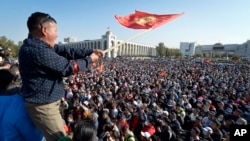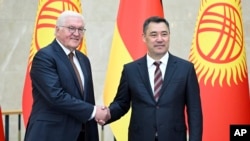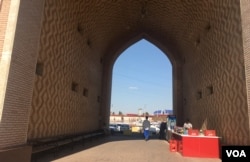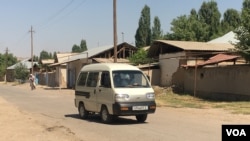WASHINGTON - Efforts to establish robust, independent civil societies are facing headwinds in the post-Soviet republics of Central Asia, where foreign-funded NGOs have long been regarded as agents of Western influence and even purveyors of “color revolutions.”
Despite their suspicions, regional governments have reluctantly allowed some space for these nongovernmental organizations to operate, largely due to pressure from the United States and the European Union. But supporters are warning of new regulations that will further restrict and even criminalize their activities.
Kyrgyzstan has the region’s most robust civil society, which activists say is now under direct threat. In Uzbekistan, officials boast of “thousands” of functioning NGOs, but they are subject to tight controls and onerous checks.
Experts there note the phenomenon of the GONGO — government-organized nongovernmental organizations — which may appear independent but are actually run by the government.
Bishkek and Tashkent both say they welcome foreign assistance and claim to support the development of civil society. In reality, NGOs struggle greatly to obtain registration and function.
‘Foreign representative’ bill in Kyrgyzstan
Earlier this month, several prominent human rights groups issued a joint statement urging lawmakers in Kyrgyzstan to reject a bill introduced by 33 legislators. The signatories included Human Rights Watch, the International Partnership for Human Rights, Norwegian Helsinki Committee, Helsinki Foundation for Human Rights, Front Line Defenders, Freedom Now, International Federation for Human Rights, and the World Organization Against Torture.
“This draft law, which draws heavily on corresponding Russian legislation and is primarily aimed at stigmatizing and restricting the activities of foreign-funded organizations, poses a direct and serious threat to Kyrgyzstan’s vibrant civil society, in particular human rights defenders and their organizations,” the statement said.
“If adopted, the draft law risks reversing previous achievements with respect to civil society development in the country and eroding the crucial role played by nongovernmental groups in promoting human rights, assisting those in need, and implementing other activities in support of the public good.”
The coalition has urged Kyrgyzstan’s partners “to speak out against this repressive legislative initiative,” stressing that its adoption would hurt assistance programs.
“The draft law is incompatible with international human rights obligations, restricting freedom of association and expression, as well as introducing in some cases criminal liability for nongovernmental organizations and their staff members,” said Syinat Sultanalieva, HRW Central Asia researcher.
Similar proposals have been pushed in Bishkek for a decade. Some lawmakers say a “foreign agent” law is needed to defend the national interests of Kyrgyzstan, where the government has been overthrown several times since 2005.
This year’s initiative labels foreign-funded entities as “foreign representatives,” and arms the Justice Ministry with new powers, such as the right to make unscheduled inspections. If a group fails to register, its activities could be suspended without a court decision.
The draft would grant the government “enhanced oversight powers, with representatives of the Justice Ministry allowed to participate in the internal activities of nongovernmental organizations” and “the right to bar organizations operating in the country from receiving funds from foreign sources.”
It also introduces criminal liability — ranging from fines to as much as 10 years in prison — for establishing or participating in an NGO found to be “inciting citizens to refuse to perform civic duties or to commit other unlawful deeds.”
VOA’s sources in Bishkek say the bill appears to have been removed from the agenda of the relevant parliamentary committee and at least 13 lawmakers are no longer supporting it. But optimism is unwarranted, say activists, who continue to engage the MPs.
Changes coming in Uzbekistan?
In Uzbekistan, the situation is a little more hopeful. There, the government is thought to be reconsidering a year-old decree requiring “significant size-grant receivers” to partner with state institutions.
“We believe they are reviewing the policy and are determined to ease the terms for civil society,” said Eldor Tulyakov, head of the Development Strategy Center, an NGO founded by the administration of President Shavkat Mirziyoyev in 2017.
“Last year’s decision by the Cabinet triggered debates within the NGO community and beyond,” Tulyakov said in an interview. “Such requirements are seen as direct interference in the work of entities that are supposed to be independent.”
But, Tulyakov said, “this measure enables civil society to navigate the system faster with a committed official partner, assisting it in specific parts of the country focusing on specific issues.” He told VOA that groups should trust the government’s promises of continued reforms.
Tulyakov sees the U.S. Agency for International Development playing a constructive role in building trust between NGOs and the government. “Their projects are designed to help us develop, to demonstrate how civil society works — supporting people and helping the state to serve them.”
NGOs as key socioeconomic actors
Mukhayo Portmann, who has run programs for international organizations in Central Asia, argues that any responsible government values civil society “because it completes its work and delivers key services to the population.”
“Ultimately, it is about the well-being of your people, and NGOs ease the state’s tasks,” Portmann said in an interview.
For her, the official suspicion of grants from other governments and of activists who pursue goals such as fighting corruption and promoting democracy “is the legacy of the Soviet system.”
Yet it is a mistake to assume that civil society groups only push for human rights, Portmann said.
“Civil society is a significant economic contributor," she said. "Look at the data and this sector’s growth impact. NGOs and donors must showcase those results. Most of these groups consist of grassroots volunteers, and solve day-to-day issues where the government is missing the mark.”
Portmann urges NGOs to be transparent in order to dispel suspicions. “Your beneficiaries, the communities you serve, need to know your mission and how you are funded," she said. "If people benefit from your work, they will often come out supporting you and the governments will have to acknowledge your service.”
Portmann sees a rocky road ahead for civil society in Central Asia, yet is optimistic that perceptions can improve.
“To be independent and influential, you need to connect with the people," she said. "I remember doing rural projects in Kyrgyzstan, where we engaged women, youth, farmers and the authorities. They knew the NGOs involved in the area and that helped everyone.”










